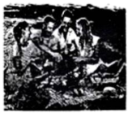阅读下面短文,从短文后所给各题的A、B、C、D四个选项中,选出可以填入空白处的最佳选项。Don’t shake hands! Don’t hug anyone! ________ order to slow the spread of COVID-19, we’re advised to avoid physical contact(接触) as ________ as possible. Some of us have been ________ to more creative ways of greeting one another, such as a friendly wave from two meters away. We are not sure when this pandemic(流行病) will end. But ________ more people get their vaccines(疫苗), we may soon be able to get back to hugging, shaking hands ans kissing cheeks. But ... should we?
We are ________ from a young age that it is impolite not to shake hands when we meet people. But Ashley Peterson, a doctor in the United States, thinks we should be more careful about how we greet people. Not ________ likes to be hugged.
Peterson says now is the perfect time for parents to guide their kids in making ________ about how to greet people. The idea is not to ________ hugs and handshakes. If your kids want to hug others, they should. If they feel ________ about hugging, they can use other ways to greet people.
Anthony Fauci, a health educator, holds a stronger opinion. He thinks we should never shake hands again. “We’ve got to ________ that custom,” he says. “That is really one of the major(主要的) ways to pass on an illness.”
【小题1】【小题2】| A.far | B.silently | C.much | D.loudly |
【小题3】| A.used | B.worried | C.embarrassed | D.disappointed |
【小题4】| A.so | B.whether | C.before | D.as |
【小题5】| A.said | B.told | C.laughed | D.stopped |
【小题6】| A.anyone | B.someone | C.everyone | D.none |
【小题7】| A.decisions | B.mistakes | C.calls | D.noises |
【小题8】| A.support | B.discuss | C.cancel | D.protect |
【小题9】| A.unknown | B.unlucky | C.uncrowded | D.uncomfortable |
【小题10】| A.save | B.break | C.choose | D.follow |



